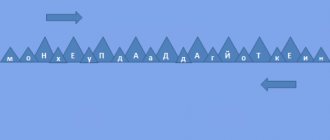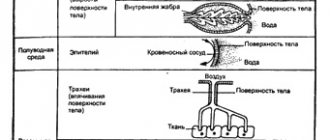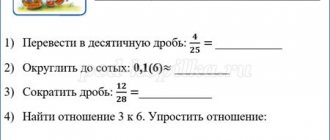Presentation of St. Sergius of Radonezh
The Tatars conquered the entire country, and strife continued between individual Russian principalities.
Sergius's parents, Kirill and Maria, were of a boyar family, but they lived very simply. They had three sons: Stephen, Bartholomew and Peter. The middle son, Bartholomew, later became St. Sergius.
St. St. Kirill and Maria. Painting of the Ascension Church on Grodka (Pavlov Posad)
From childhood, Bartholomew attracted the attention of his parents with his kindness, love of prayer and visiting church.
Youth Bartholomew
priest Sergius Simakov
When he and his brothers began to study, he turned out to be
so incapable that he could not learn to read.
Sergius of Radonezh at school. Miniature from the front "Life of St. Sergius of Radonezh." XVI century
One day his father sent him to the field to bring horses.
Alexander Kharitonov. Sergius of Radonezh
In the forest, he suddenly saw an old priest who called him to him. Bartholomew told him about his grief with teaching, the elder consoled him and gave him a piece of prosphora to eat.
Blessing of the Youth Bartholomew
Sergey Efoshkin
The beginning of monastic life
When the boy picked up the book, he suddenly began to read correctly and well.
St. Sergius in the family. Reading. Sergey Efoshkin
Radonezh. Reconstruction of G.V. Borisevich
Soon Kirill and Maria and their children had to flee from Rostov, and they settled in Radonezh, in the Principality of Moscow.
Bartholomew convinced his older brother Stefan to go with him far into the wild forest and live there together, spending all the time in prayer and work.
Murals in the Trinity-Sergius Lavra
It was difficult in the forest, especially in winter, and Stefan, unable to withstand such a hard life, returned to the monastery in Moscow.
Sergius of Radonezh. N.K. Roerich
Saint Sergius of Radonezh
Nesterov M.V.
A monk from a nearby monastery who came to him ordained Bartholomew as a monk, giving him the name Sergius.
Sergius was left completely alone.
Sergey Efoshkin. Venerable Sergius. For water. For brushwood.
He was not afraid of animals and shared his bread with the bear, and protected himself from fears with prayer.
Foundation of the Trinity Monastery
People began to talk about the young hermit, and many came to him for advice and prayer
Efoshkin Sergey
Elder and novice
Some stayed to live with him, building themselves
small cell houses. So there were 12 monks.
Sergey Efoshkin. Venerable Sergius. Construction of the monastery
Saint Sergius himself worked most of all - he built cells for others, chopped wood, baked bread, cooked food, carried water.
Sergey Efoshkin.
Venerable Sergius.
Works in the bakery.
Finally, the monks persuaded him to become their abbot, the bishop ordained him a priest and placed him at the head of the new monastery.
Painting in the Trinity-Sergius Lavra
The monastery was very poor. There were no candles in the church and services were served by the light of a torch. The Communion cup was made of wood, prayers were copied on tree bark, since there were no books.
Settlement of people near the Trinity Monastery. Miniature. Personal Life of St. Sergius of Radonezh. Early 90s XVI century.
The Monk Sergius promised to allow them to go begging if they waited one more day, and he himself began to pray.
Sergey Efoshkin. Venerable Sergius. Solitary prayer
Sergius opened the window and saw an extraordinary light from the sky and many beautiful birds on the roofs and in the courtyard of the monastery.
Metropolitan Alexy of Moscow knew and loved Sergius.
St. Sergius tried to reconcile the princes and prayed to the Holy Trinity, in whose name the monastery was built.
Icon of St. Sergius of Radonezh
from the Trinity-Sergius Lavra
Venerable himself Sergius remained the most humble of all the monks, wore the most shabby and poor clothes, worked and served others.
Nesterov M. V. “Works of Sergius of Radonezh”
Sergius of Radonezh and Dmitry Donskoy
The Moscow prince Dimitri Ivanovich also came to St. Sergius when he gathered an army from all over Rus' to try to defeat the Tatars.
Dmitry Donskoy with Sergius of Radonezh. Miniature from the front “Life of Sergius of Radonezh”. XVI century
The monk blessed the prince and quietly said to him: “Go, prince, and the God of righteousness will give you victory.”
Ryzhenko Pavel. Blessing of Dmitry Donskoy by Sergius of Radonezh
The monk sent two monks, former warriors, Peresvet and Oslyabya, together with the prince to battle.
Namerovsky A. Sergius of Radonezh blesses Dmitry Donskoy for a feat of arms.
“Go boldly, prince, and may God help you!”
Pantyukhin Yu.P.
Dmitry Donskoy and Sergius of Radonezh
The battle took place on the Kulikovo Field and was very brutal.
The Tatars, under the command of Khan Mamai, have already begun to overcome...
The Tatars trembled and ran.
Throughout the battle, St. Sergius stood in prayer and, as if seeing the battlefield in front of him, called by the names of those who fell killed, and prayed for them.
Saint Sergius of Radonezh.
The prayers and holiness of St. Sergius helped Rus' to withstand the most difficult and dark time of Russian history.
Saint Sergius of Radonezh.
Thousands of people pass every day in front of the tomb of the saint in the Trinity-Sergius Lavra, fervently praying to St. Sergius and asking for his prayers.
Holy Reverend Father Sergius, pray to God for us!
"Sergius of Radonezh". Presentation for a history lesson.
3/18/18
Sergius of Radonezh.
The beginning of the 14th century was a difficult time for the Russian land. The destroyed cities and villages were restored very slowly; residents gave a significant part of their income to the khans in the Golden Horde. The Crusaders threatened Rus' from the west, and the Grand Duchy of Lithuania from the south. Discord continued between the Russian princes.
In these conditions, faith in God and his mercy became salvation and consolation for many people. Ordinary people and princes in difficult times went to the holy elders for advice. One of the most famous holy elders at that time was Sergius of Radonezh.
The future wonderworker Sergius of Radonezh was born in 1314 into the family of Rostov boyars Cyril and Maria. At baptism he received the name Bartholomew. At the age of 7, Bartholomew, along with his older brother Stefan and younger Peter, was sent to school. But, unlike his brothers, studying was difficult for him. He couldn't learn to read.
The teacher scolded him, his parents were upset, he himself prayed with tears, but his studies did not move forward. And then an event occurred, which is reported in all the biographies of Sergius.
Bartholomew was looking for runaway horses in the field and saw an old man - a monk - praying under an oak tree. The elder asked the boy: “What are you looking for and what do you want, child?”
Nesterov M. V. “Vision to the youth Bartholomew”
Bartholomew spoke about his grief and asked the elder to pray that God would help him overcome the letter. The elder prayed and said: “From now on, the Lord will grant you good knowledge of literacy, greater than that of your brothers and peers.”
The boy invited the monk to his house, his parents fed the old man. As he was leaving, the monk said: “After my departure, the boy will have good literacy and understanding of the holy books. And here is the second prediction for you: the boy will be great before God and people for his virtuous life.”
When the monk left, the boy picked up the book and suddenly began to read correctly and well.
Soon the parents noticed the special kindness of their son, his love for prayer and visiting church. He often kept strict fasts, got up at night to pray, and soon announced his desire to enter a monastery.
After some time, Bartholomew’s impoverished parents decided to move from Rostov to the small village of Radonezh not far from Moscow. Bartholomew's brother Stefan became a monk of the Intercession Khotkovsky Monastery. After the death of his parents, Bartholomew left his part of the inheritance to his brother Peter and also entered the monastery.
Bartholomew persuaded Brother Stefan to leave the monastery and settle in a deep forest, on a hill near Radonezh.
The brothers built a small wooden church in the name of the Holy Trinity and a cell. Life in the desert forest was very difficult. Stefan, unable to bear the hardships, soon went to Moscow to the Epiphany Monastery.
Bartholomew was left completely alone. He underwent the rite of initiation into a monk and received a new name - Sergius. He was 23 years old at that time.
Sergius lived alone in the forest for about two years, living in daily labors and prayers.
One day a bear came to his cell, the holy hermit shared his last piece of bread with him, and from then on the beast began to constantly visit Sergius.
Rumors about Sergius's life spread. People began to come to him, asking him to take him in.
Thus, in a deep forest, a monastery appeared, later named Trinity-Sergius. At first there were 12 monks. They built 12 cells and a fence to protect them from animals.
Sergius made it a rule that all monks should live from their labor without accepting alms. The monks planted a vegetable garden, lived very poorly, and sometimes went hungry. Sergius himself set an example for them in work: he carried logs, carried water uphill, ground grain with hand millstones, baked bread, cooked food, cut and sewed clothes.
In summer and winter, Sergius wore the same clothes, neither the frost nor the heat bothered him. Physically, despite the meager food, he was very strong, “he had the strength against two people.”
People began to come to Sergius for advice and blessings, some settled nearby, others donated their property to the monastery. The monastery grew, and the glory of Sergius grew.
They said about Saint Sergius that he worked miracles. One day, the monastery where Sergius was staying ran out of water. He began to pray, found a place, baptized it, and a real miracle happened - a spring appeared in this place, which is now called Sergiev. The water of this spring healed those who drank it in faith.
One day a local resident brought his sick son to Sergius. But the child died, the father went to get the coffin, and when he returned, the child was alive and well.
Ordinary people and princes came to Saint Sergius for healing and advice, and sometimes just to see him.
Sergius dreamed and prayed for the unification of Rus'. “With “quiet and meek words” he could act on the most hardened and hardened hearts.”
Very often he reconciled princes warring among themselves, persuading them to submit to the Grand Duke of Moscow (for example, the Rostov prince in 1356, the Nizhny Novgorod prince in 1365, Oleg of Ryazan, etc.).
In addition to Trinity, Sergius of Radonezh founded several more monasteries; in all of these monasteries he appointed his students as abbots. His disciples founded more than 40 monasteries in different parts of Rus', built churches, gathering around them supporters of a single Orthodox faith and a single country.
The words and deeds of Sergius of Radonezh served as the beginning of a spiritual revival and the unification of Rus' after hostility and civil strife.
Father Sergius sought to eradicate evil on earth, to destroy the lies and shortcomings of people. But towards the end of my life I realized that I was unable to do this. Then he swore an oath never to talk to anyone until evil was destroyed.
So he died in silence, living to a ripe old age - 78 years old.
Sergius of Radonezh is revered as the patron saint of the Russian land, mentor of monastics, patron of the Russian army, and special patron of children who want to achieve success in school.
The Trinity-Sergius Monastery, founded by Sergius of Radonezh, grew and grew richer over the centuries. Wooden buildings were replaced by stone ones, and new churches were built. In the 18th and 19th centuries, the Trinity-Sergius Lavra was one of the richest monasteries in Russia and was one of the largest landowners.
The city of Sergiev Posad, Moscow region. View of the Trinity-Sergius Lavra. Photochrome (color lithography) 1890s.
Trinity-Sergius Lavra. Modern look.
The Lavra brethren number about 200 monks.
The monastery operates an Orthodox publishing house and a pilgrimage center, and regularly conducts excursions for visitors.
- What was the name of the monastery, the founder of which was Sergius of Radonezh? (282)
- What did the monks do in the monasteries? (284)
- Why did people come to Sergius of Radonezh? (284)
- Who is a hermit? (286)
- Who is a novice? (288)
Homework: pp. 282-288
“Life can be arranged only with goodness and love,” he said. “For by responding evil to evil, a person gives birth to new evil!”




